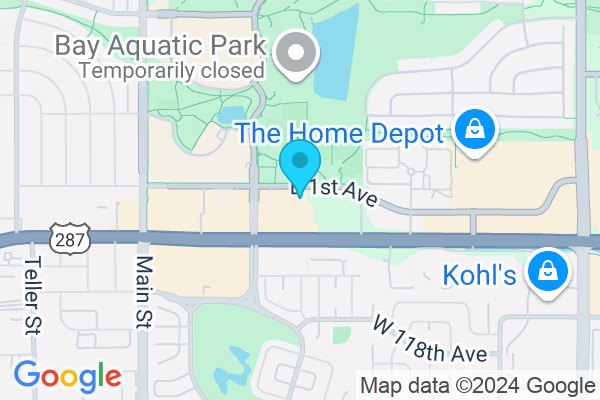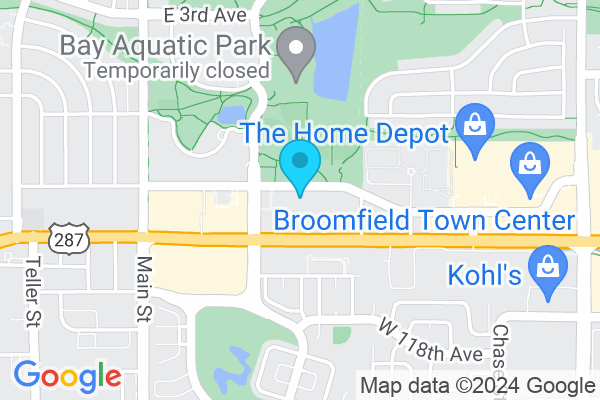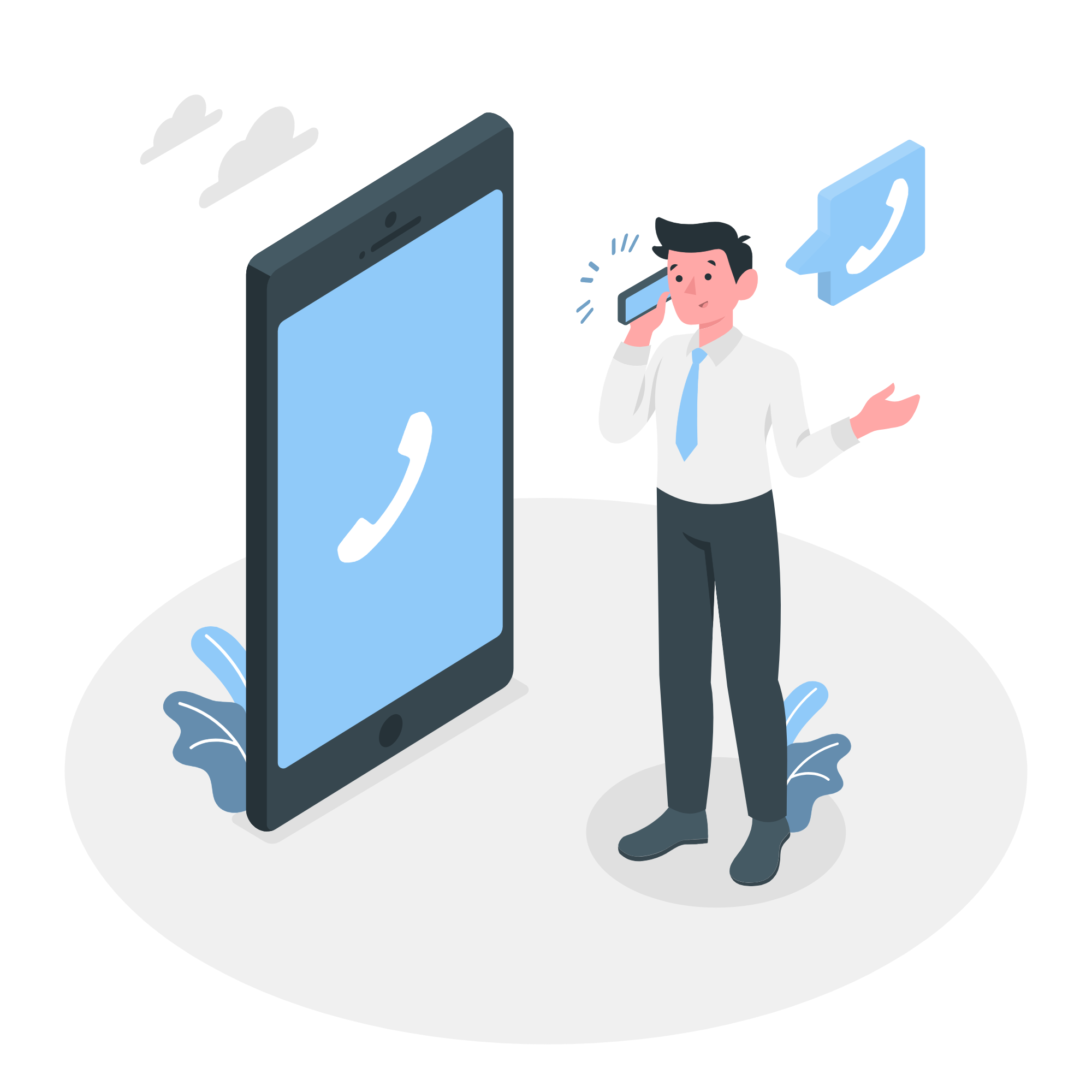TMS Success Rate
A hallmark study involving 42 clinics across the US showed 58% of patients experienced significant response for depression after 30 TMS sessions. Inspire TMS Denver is achieving greater than 75% response rate for our patients.
TMS Success Rate
A hallmark study involving 42 clinics across the US showed 58% of patients experienced significant response for depression after 30 TMS sessions. Inspire TMS Denver is achieving greater than 75% response rate for our patients.
As a relatively new therapy for Major Depression and associated anxiety and other mental health disorders, many prospective patients will naturally want to weigh the pros and cons of TMS (Transcranial Magnetic Stimulation) and its success rate. Approved for the treatment of Major Depressive Disorder in 2008, TMS is still finding its foothold amongst traditional treatments, and the wider medical community often remains largely unaware of TMS and its benefits compared to typical treatments. To get a better picture of the efficacy of TMS, it helps to compare it to the success rates of more conventional treatments for depression and to consider the number of individuals that suffer from depression.
In 2017, The World Health Organization (WHO) estimated that depression affected 264 million people worldwide.¹ Additional studies have estimated that over 300 million people worldwide suffer from depression at any one time and that approximately 15% of the world’s population will experience depression during their lifetime. Depression is also the leading cause of disability worldwide.² Also in 2017, the National Institute of Mental Health (NIMH) estimated that over 17 million of all US adults (7.1%) suffered from depression.
As a relatively new therapy for Major Depression and associated anxiety and other mental health disorders, many prospective patients will naturally want to weigh the pros and cons of TMS (Transcranial Magnetic Stimulation) and its success rate. Approved for the treatment of Major Depressive Disorder in 2008, TMS is still finding its foothold amongst traditional treatments, and the wider medical community often remains largely unaware of TMS and its benefits compared to typical treatments. To get a better picture of the efficacy of TMS, it helps to compare it to the success rates of more conventional treatments for depression and to consider the number of individuals that suffer from depression.
In 2017, The World Health Organization (WHO) estimated that depression affected 264 million people worldwide.¹ Additional studies have estimated that over 300 million people worldwide suffer from depression at any one time and that approximately 15% of the world’s population will experience depression during their lifetime. Depression is also the leading cause of disability worldwide.² Also in 2017, the National Institute of Mental Health (NIMH) estimated that over 17 million of all US adults (7.1%) suffered from depression.
Antidepressant success rate
Standard initial treatment for Depressive and Anxiety Disorders typically includes medication management with antidepressants. Between 2015-2018, over 13% of US adults had used antidepressants in the last 30 days, and usage amongst women was double that of men. In total, approximately 25+ million American adults are taking antidepressants.³ With this many people taking antidepressants at any one time, we would hope for strong success rates with the use of medications. Unfortunately for many suffering from depression, this is not the case.
The most frequently quoted study regarding this is the STAR*D trial - Sequenced Treatment Alternatives to Relieve Depression.⁴ This study looked at remission rates from depression for adults receiving antidepressant treatment across the United States. Patients received four stages of treatment with different medication(s) at each ‘step’ in treatment. This large study showed that each step of treatment led to a decreasing chance of success for remission and a corresponding increased likelihood of stopping medication secondary to side effects. The table below depicts this.
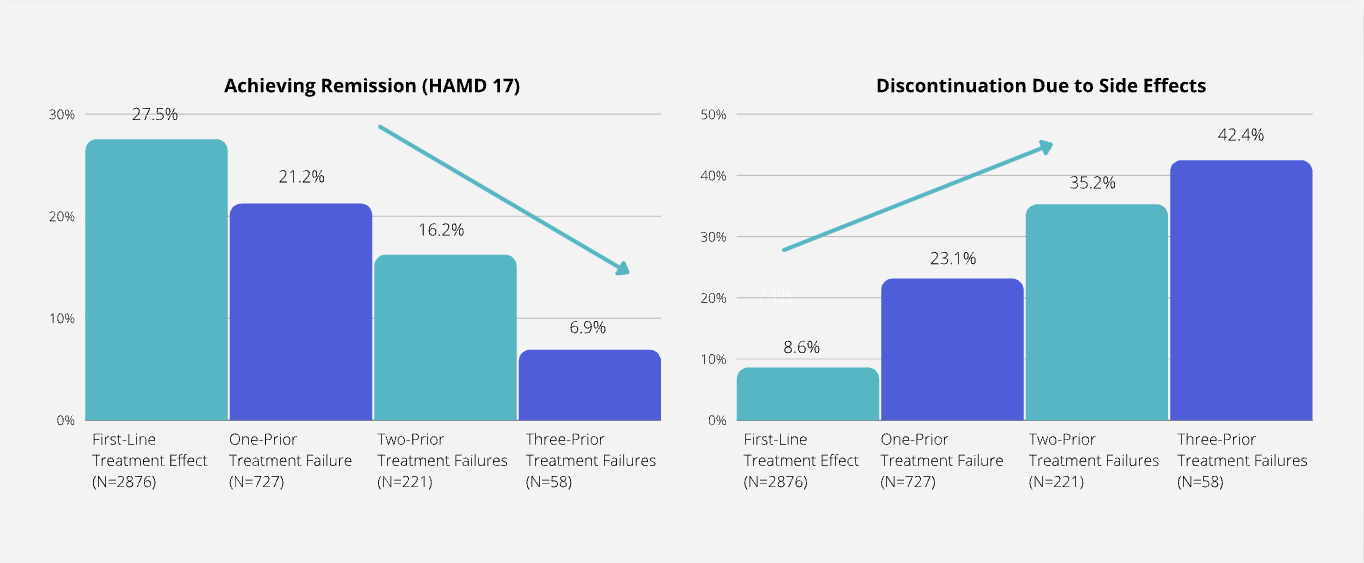
In addition, at the end of the study, nearly one-third of all patients still had not achieved remission from depression. Even those that did experience remission initially, often relapsed back into depression. Relapse rates varied from 40-71% across all the steps of treatment, and increasing frequency of relapse with more medication trials.
Therapy success rate
What can the STAR*D trial tell us about therapy success? Step 2 of the study involved the option of adding cognitive behavioral therapy (CBT) to the 2nd medication trial. The remission rate for these individuals was still only 31%, however, and it took an average of 55 days to reach this remission. There are many other studies that point to therapy as an effective treatment for mild to moderate depression, but there is less convincing evidence for response to therapy in severe major depression.⁵ Patients can also attest to the fact that the quality and success rate of therapy can vary widely between counselors. There is also a considerable time commitment needed for therapy, often entailing months or even years, and each session typically takes an hour or longer.
Electroconvulsive Therapy Success Rate
Electroconvulsive Therapy (ECT)
is often a last resort and usually only administered in cases of severe mental illness, but it can have an exceptionally high recovery rate. Studies point to a wide range of remission, however - in the range of 40-80%.⁶⁷ Relapse rates likewise tend to be high, however, with 40-80% experiencing recurrence of depression within the first six months to a year following cessation of ECT treatment.⁸⁹ECT also requires inpatient monitoring and anesthesia to induce a seizure safely with a period of recovery following. There can also be substantial cognitive risks such as memory loss. Unfortunately, its historic, and often intimidating reputation renders it unpopular despite huge modern improvements. With that said, there are valid reasons to not pursue ECT and even this strategy doesn't always work.
TMS Success Rates
This finally brings us to the success rate forTranscranial Magnetic Stimulation.
In one of the most frequently quoted and large studies using TMS for treatment of depression, 58% of patients experienced significant response and 37% of patients experienced full remission after 30 treatment sessions.¹⁰ Another study that extended treatment up to one year and included patients that received additional TMS treatment as necessary (about ⅓ of patients), showed an increased response rate of 67% and remission rate of 45%.¹¹ Drop-out rates consistently are only around 5% across many studies to date with no systemic side effects. These aforementioned studies date back to 2012 and 2014 and many TMS centers are reporting even higher rates of remission today. The largest current TMS patient registry of 10,000+ patients is getting similar results depending on which rating scale is utilized.¹² At Inspire TMS Denver, we are achieving higher rates of response and remission based on patient rating scales. Our patients report greater than 75% response and 45% remission from depressive symptoms.
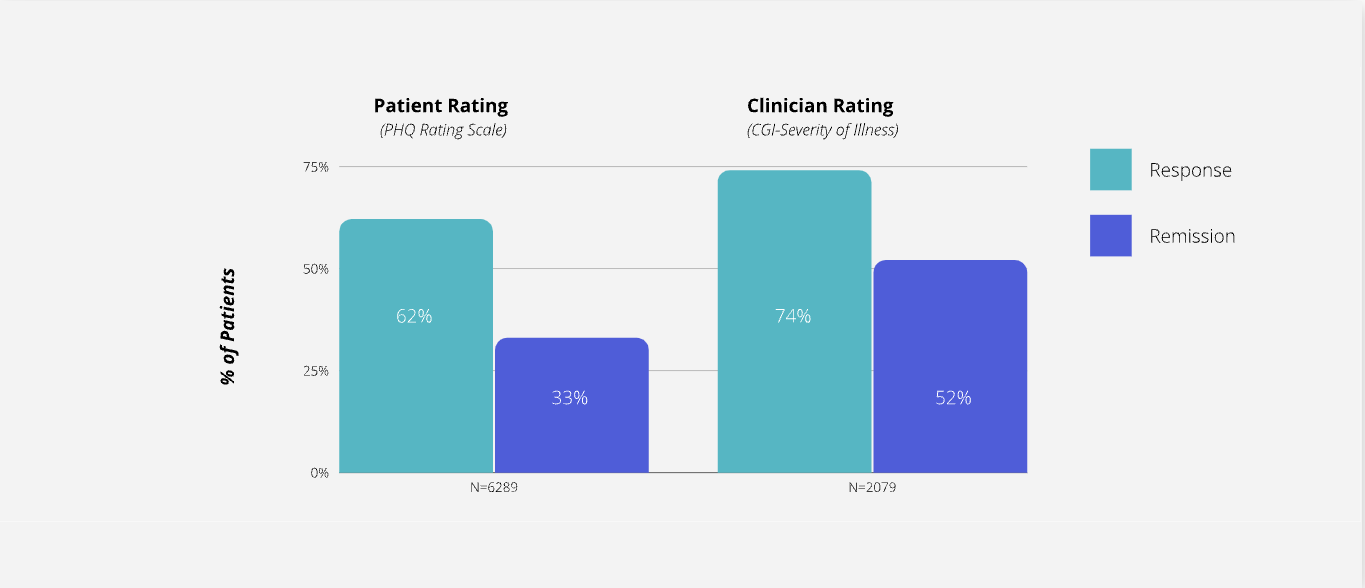
Most insurance companies will require at least two antidepressant failures to pursue TMS treatment. Using a third medication trial as a benchmark, we see that medications only resulted in a 16.2% remission rate in the pivotal STAR*D trial. The response rate was not much better at less than 20%. Therapy might increase this to 31% remission, but this was in a highly structured setting with frequent and standardized counseling. If needing a fourth medication trial, the results are even poorer with just 7% of individuals experiencing remission. ECT success rates are much higher, but ECT involves a number of barriers to routine use and potential side effects as referenced.
Compare this to TMS results, where current real-world expectations are around 40% remission and 60-70% response. These numbers are even more impressive considering that most of these patients have failed at least two or more medication trials and some have even failed ECT. Comparing all these treatment options, TMS should be strongly considered as a first-line treatment after one to two medication trials.
TMS Therapy at Inspire TMS Denver
As a patient of Inspire TMS Denver, all TMS treatment options will be discussed with you before embarking on a course of treatment. We always take into account additional medication and non-medication treatments that may improve your chance for success. We coordinate with your established treatment providers to ensure the right combination of therapies are being utilized.¹²
We also help you to incorporate additional tools to fight depression, anxiety, and other mental health symptoms. We ensure you understand the chance for success with TMS therapy and how this is influenced by other therapies. Our treatments are tailored to your individual needs to achieve optimal response.Whatever TMS treatment you choose, rest assured that Inspire TMS Denver will tailor treatment protocols to your individual symptoms and situation. We promise to keep you informed and comfortable with your individual care plan.
Antidepressant success rate
Standard initial treatment for Depressive and Anxiety Disorders typically includes medication management with antidepressants. Between 2015-2018, over 13% of US adults had used antidepressants in the last 30 days, and usage amongst women was double that of men. In total, approximately 25+ million American adults are taking antidepressants.³ With this many people taking antidepressants at any one time, we would hope for strong success rates with the use of medications. Unfortunately for many suffering from depression, this is not the case.
The most frequently quoted study regarding this is the STAR*D trial - Sequenced Treatment Alternatives to Relieve Depression.⁴ This study looked at remission rates from depression for adults receiving antidepressant treatment across the United States. Patients received four stages of treatment with different medication(s) at each ‘step’ in treatment. This large study showed that each step of treatment led to a decreasing chance of success for remission and a corresponding increased likelihood of stopping medication secondary to side effects. The table below depicts this.

In addition, at the end of the study, nearly one-third of all patients still had not achieved remission from depression. Even those that did experience remission initially, often relapsed back into depression. Relapse rates varied from 40-71% across all the steps of treatment, and increasing frequency of relapse with more medication trials.
Therapy success rate
What can the STAR*D trial tell us about therapy success? Step 2 of the study involved the option of adding cognitive behavioral therapy (CBT) to the 2nd medication trial. The remission rate for these individuals was still only 31%, however, and it took an average of 55 days to reach this remission. There are many other studies that point to therapy as an effective treatment for mild to moderate depression, but there is less convincing evidence for response to therapy in
severe major depression.⁵ Patients can also attest to the fact that the quality and success rate of therapy can vary widely between counselors. There is also a considerable time commitment needed for therapy, often entailing months or even years, and each session typically takes an hour or longer.
Therapy success rate
What can the STAR*D trial tell us about therapy success? Step 2 of the study involved the option of adding cognitive behavioral therapy (CBT) to the 2nd medication trial. The remission rate for these individuals was still only 31%, however, and it took an average of 55 days to reach this remission. There are many other studies that point to therapy as an effective treatment for mild to moderate depression, but there is less convincing evidence for response to therapy in
severe major depression.⁵ Patients can also attest to the fact that the quality and success rate of therapy can vary widely between counselors. There is also a considerable time commitment needed for therapy, often entailing months or even years, and each session typically takes an hour or longer.
Electroconvulsive Therapy Success Rate
Electroconvulsive Therapy (ECT) is often a last resort and usually only administered in cases of severe mental illness, but it can have an exceptionally high recovery rate. Studies point to a wide range of remission, however - in the range of 40-80%.⁶⁷ Relapse rates likewise tend to be high, however, with 40-80% experiencing recurrence of depression within the first six months to a year following cessation of ECT treatment.⁸⁹ECT also requires inpatient monitoring and anesthesia to induce a seizure safely with a period of recovery following. There can also be substantial cognitive risks such as memory loss. Unfortunately, its historic, and often intimidating reputation renders it unpopular despite huge modern improvements. With that said, there are valid reasons to not pursue ECT and even this strategy doesn't always work.
TMS Success Rates
This finally brings us to the success rate forTranscranial Magnetic Stimulation.
In one of the most frequently quoted and large studies using TMS for treatment of depression, 58% of patients experienced significant response and 37% of patients experienced full remission after 30 treatment sessions.¹⁰ Another study that extended treatment up to one year and included patients that received additional TMS treatment as necessary (about ⅓ of patients), showed an increased response rate of 67% and remission rate of 45%.¹¹ Drop-out rates consistently are only around 5% across many studies to date with no systemic side effects. These aforementioned studies date back to 2012 and 2014 and many TMS centers are reporting even higher rates of remission today. The largest current TMS patient registry of 10,000+ patients is getting similar results depending on which rating scale is utilized.¹² At Inspire TMS Denver, we are achieving higher rates of response and remission based on patient rating scales. Our patients report greater than 75% response and 45% remission from depressive symptoms.

Most insurance companies will require at least two antidepressant failures to pursue TMS treatment. Using a third medication trial as a benchmark, we see that medications only resulted in a 16.2% remission rate in the pivotal STAR*D trial. The response rate was not much better at less than 20%. Therapy might increase this to 31% remission, but this was in a highly structured setting with frequent and standardized counseling. If needing a fourth medication trial, the results are even poorer with just 7% of individuals experiencing remission. ECT success rates are much higher, but ECT involves a number of barriers to routine use and potential side effects as referenced.
Compare this to TMS results, where current real-world expectations are around 40% remission and 60-70% response. These numbers are even more impressive considering that most of these patients have failed at least two or more medication trials and some have even failed ECT. Comparing all these treatment options, TMS should be strongly considered as a first-line treatment after one to two medication trials.
TMS Therapy at Inspire TMS Denver
As a patient of Inspire TMS Denver, all TMS treatment options will be discussed with you before embarking on a course of treatment. We always take into account additional medication and non-medication treatments that may improve your chance for success. We coordinate with your established treatment providers to ensure the right combination of therapies are being utilized.¹²
We also help you to incorporate additional tools to fight depression, anxiety, and other mental health symptoms. We ensure you understand the chance for success with TMS therapy and how this is influenced by other therapies. Our treatments are tailored to your individual needs to achieve optimal response.Whatever TMS treatment you choose, rest assured that Inspire TMS Denver will tailor treatment protocols to your individual symptoms and situation. We promise to keep you informed and comfortable with your individual care plan.
References
¹ Mental Health - Our World In Data
³ Products - Data Briefs - Number 377 - September 2020 (cdc.gov)
⁴ https://www.nimh.nih.gov/funding/clinical-research/practical/stard/allmedicationlevels
⁵ https://www.aafp.org/afp/2006/0101/p83.html
⁶https://www.sciencedirect.com/science/article/pii/S0924933817329176
⁸https://pubmed.ncbi.nlm.nih.gov/11255384/
⁹https://www.ncbi.nlm.nih.gov/pmc/articles/PMC3799066/
¹⁰https://pubmed.ncbi.nlm.nih.gov/22689344/
¹² https://neurostar.com/hcp/efficacy/neurostar-efficacy-results/
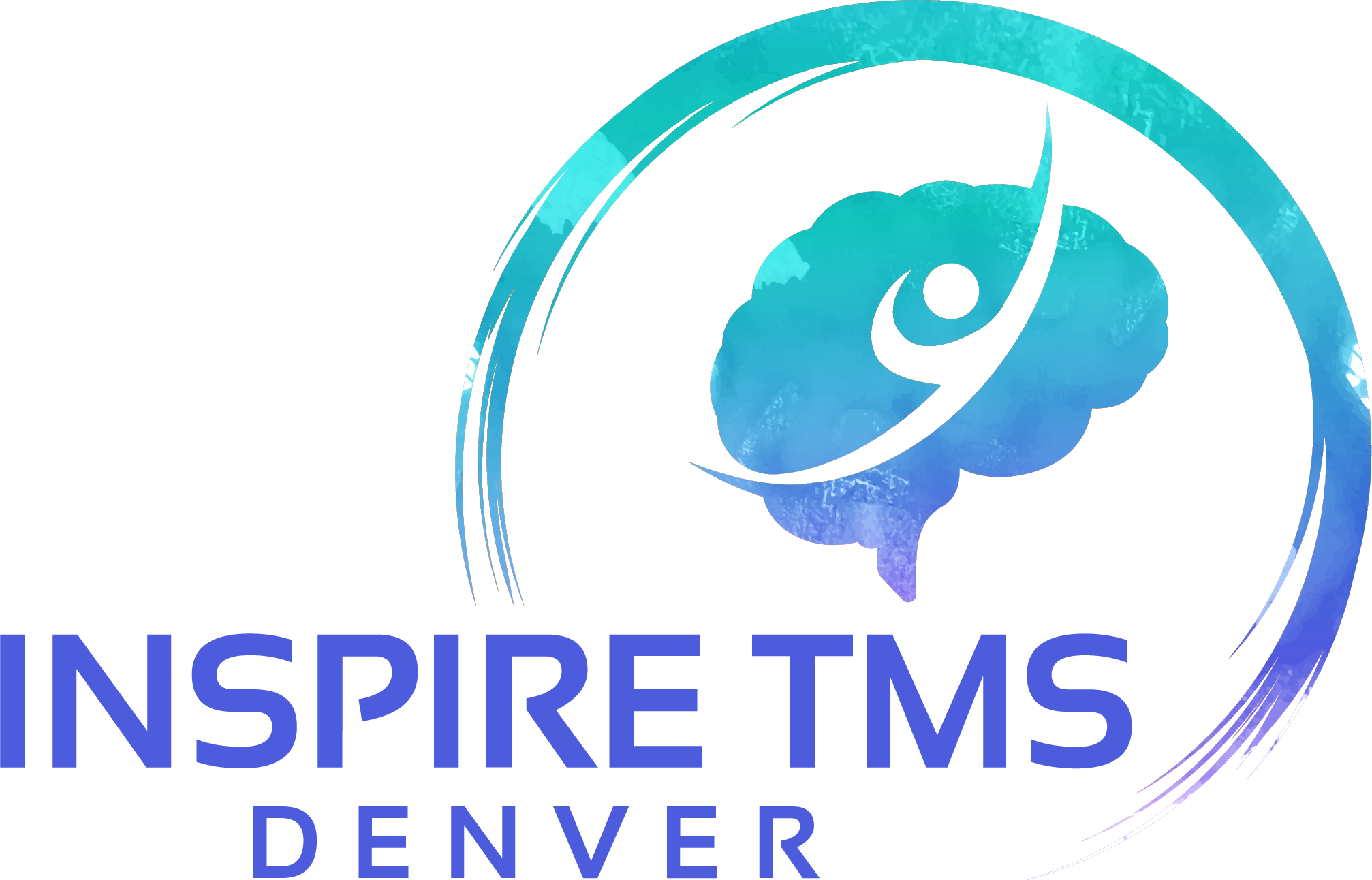
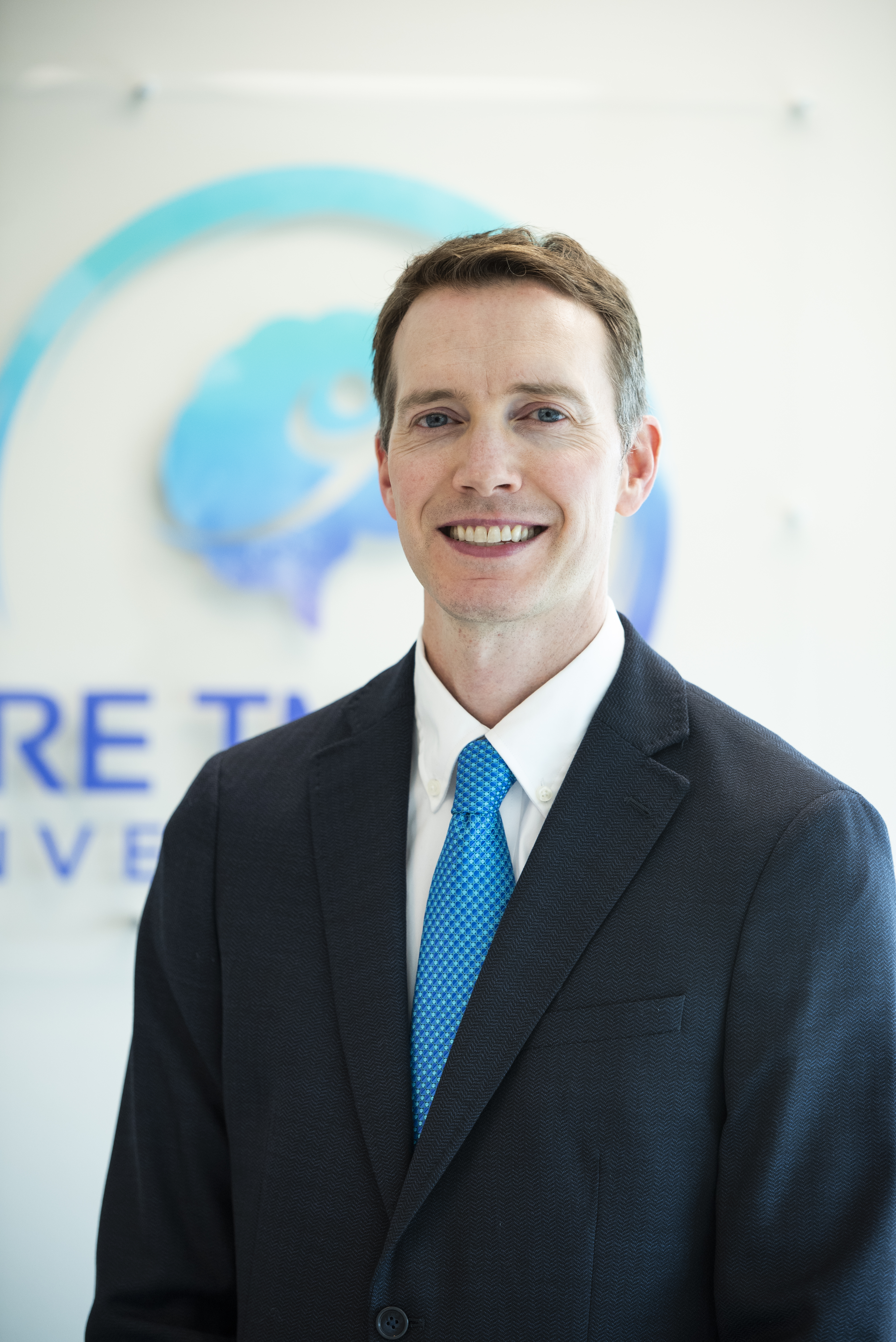
Meet Dr. Clinch
Inspire TMS Denver was founded by Sam Clinch, MD, a board-certified Psychiatrist with over 10 years’ experience in the field. He opened Inspire TMS Denver after realizing the limitations of medications and counseling for a significant portion of his patients. He dove back into the latest literature on advanced treatments and saw that TMS was providing solutions for those with treatment resistance. He has provided TMS services at the VA during his residency training, completed a fellowship at Duke University in TMS, and received additional TMS training through the Clinical TMS Society.
His peers recognized him as a 5280 Top Doctor in Psychiatry for 2020 and he is a member of the American Psychiatric Association, Colorado Psychiatric Association, and the Clinical TMS Society. He was a finalist for Teacher of the Year for the CO Permanente Medical Group in 2017 and the Behavioral Health Provider of the Year for the Hidden Lake Medical Office in 2017.
Find Us Here!
Meet Dr. Clinch

Inspire TMS Denver was founded by Sam Clinch, MD, a board-certified Psychiatrist with over 10 years’ experience in the field. He opened Inspire TMS Denver after realizing the limitations of medications and counseling for a significant portion of his patients. He dove back into the latest literature on advanced treatments and saw that TMS was providing solutions for those with treatment resistance. He has provided TMS services at the VA during his residency training, completed a fellowship at Duke University in TMS, and received additional TMS training through the Clinical TMS Society.
His peers recognized him as a 5280 Top Doctor in Psychiatry for 2020 and he is a member of the American Psychiatric Association, Colorado Psychiatric Association, and the Clinical TMS Society. He was a finalist for Teacher of the Year for the CO Permanente Medical Group in 2017 and the Behavioral Health Provider of the Year for the Hidden Lake Medical Office in 2017.
Find Us Here!
Still unsure? That's okay!
Find out with our depression/anxiety quiz
No cost, secure, and confidential.

or
Still unsure? That's okay!
Find out with our depression/anxiety quiz
No cost, secure, and confidential.

or
Ⓒ 2024 — Inspire TMS Denver — All rights reserved
Contact Info
Business Hours
Mon: 8am - 5pm
Tues: 8am - 5pm
Wed: 8am - 5pm
Thurs: 8am - 5pm
Fri: 8am - 5pm
Sat/Sun: Closed
